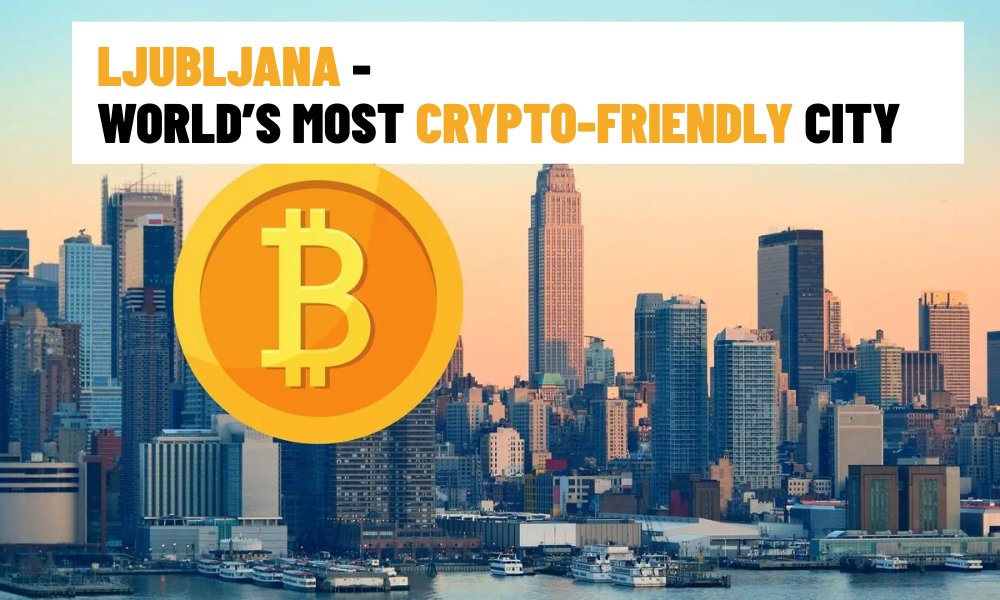On April 25, 2025, Ljubljana, the charming capital of Slovenia, was crowned the world’s most crypto-friendly city in the 2025 Crypto City Index by Multipolitan, a migration advisory firm. Surpassing global financial giants like Hong Kong, Zurich, and Singapore, Ljubljana’s unexpected rise highlights its progressive policies, robust infrastructure, and vibrant blockchain ecosystem. This accolade marks a significant milestone for a relatively small city, positioning it as a global leader in the adoption of cryptocurrency and blockchain technology. Here’s why Ljubljana stands out and what this means for the future of crypto innovation.
A Robust Crypto Infrastructure
Ljubljana’s ascent to the top is driven by its comprehensive crypto infrastructure, seamlessly integrated into daily life. The city boasts over 150 cryptocurrency ATMs, one of the highest densities per capita globally, enabling residents and visitors to buy and sell digital assets like Bitcoin (BTC) and Ethereum (ETH) with ease. These ATMs are strategically located across the city, from bustling downtown areas to quieter neighborhoods, ensuring accessibility for all.
Beyond ATMs, Ljubljana’s retail and hospitality sectors have embraced crypto payments. Over 1,200 businesses, including restaurants, cafes, boutique shops, and even taxi services, accept cryptocurrencies, making digital transactions a practical reality. This widespread adoption normalizes crypto as a medium of exchange, moving it beyond speculative investment to everyday utility. For instance, locals can pay for a coffee or a meal with BTC, a rarity in many larger financial hubs.

Progressive Policies and Regulatory Clarity
Slovenia’s forward-thinking regulatory framework has been a cornerstone of Ljubljana’s success. The government has implemented clear tax guidelines for crypto transactions, treating digital assets as property for tax purposes, which provides certainty for businesses and investors. Unlike jurisdictions with ambiguous or restrictive policies, Slovenia’s balanced approach encourages innovation while ensuring compliance.
Ljubljana benefits from Slovenia’s membership in the European Union, which has introduced progressive crypto regulations like the Markets in Crypto-Assets (MiCA) framework. This harmonized EU legislation enhances investor protection and fosters cross-border blockchain projects, giving Ljubljana a competitive edge. The city’s regulators actively engage with crypto startups, offering sandbox programs to test innovative solutions, further solidifying its reputation as a blockchain-friendly hub.
A Thriving Blockchain Ecosystem
Ljubljana’s crypto-friendly status is bolstered by a dynamic blockchain community, nurtured by organizations like Blockchain Alliance Europe. This group connects developers, entrepreneurs, and enthusiasts, fostering collaboration and innovation. The city hosts regular blockchain meetups, hackathons, and conferences, attracting global talent and investment. Notable startups, such as Bitstamp (one of the world’s oldest crypto exchanges, founded in Slovenia), have roots in Ljubljana, underscoring its role as a breeding ground for crypto pioneers.
The city’s universities and tech incubators also play a pivotal role, offering blockchain-focused courses and funding for Web3 projects. This synergy between academia, industry, and community has created a self-sustaining ecosystem, driving advancements in decentralized finance (DeFi), non-fungible tokens (NFTs), and tokenized real-world assets (RWAs).
Lifestyle and Economic Advantages
Multipolitan’s index evaluates cities based on regulation, infrastructure, and lifestyle factors, and Ljubljana excels in all three. The city’s high quality of life, with affordable living costs compared to Western European capitals, attracts crypto entrepreneurs and digital nomads. Its picturesque setting, with the Ljubljanica River and medieval architecture, offers a serene backdrop for innovation, while reliable internet and modern co-working spaces cater to tech professionals.
Slovenia’s stable economy and low crime rates further enhance Ljubljana’s appeal. The city’s proximity to major European markets, coupled with Slovenia’s eurozone membership, makes it an ideal base for crypto businesses seeking global reach. Posts on X, such as those from @Crypto_TownHall and @Cryptotvplus, highlight Ljubljana’s balanced excellence, noting its ability to outshine financial powerhouses like Hong Kong and Singapore.

Outpacing Global Competitors
Ljubljana’s top ranking is particularly striking given the competition. Hong Kong and Zurich, tied for second, are renowned for their crypto-friendly regulations and institutional adoption, while Singapore and Abu Dhabi, rounding out the top five, boast advanced financial ecosystems. Yet, Ljubljana’s smaller size proved an advantage, enabling agile policy implementation and community-driven adoption. Unlike megacities, where bureaucracy can stifle innovation, Ljubljana’s compact scale fosters rapid integration of crypto solutions.
The city’s victory also reflects a broader trend: smaller jurisdictions are emerging as crypto hubs by prioritizing adaptability and accessibility. As noted by @CashbackEx on X, Ljubljana’s rise challenges the dominance of traditional financial centers, signaling a shift toward decentralized, inclusive economies.
Implications for the Crypto Market
Ljubljana’s designation as the world’s most crypto-friendly city has far-reaching implications. For investors, it highlights Slovenia as a prime destination for blockchain ventures, with potential for high returns in a supportive environment. Crypto startups may flock to Ljubljana, drawn by its infrastructure and regulatory clarity, driving further innovation in DeFi, Web3, and tokenized assets.
For the global crypto market, Ljubljana’s success sets a benchmark for other cities. Its model—combining infrastructure, regulation, and community engagement—could inspire jurisdictions worldwide to accelerate crypto adoption. The city’s prominence may also boost the eurozone’s role in the crypto economy, especially as the EU implements MiCA.
Challenges and Future Outlook
Despite its achievements, Ljubljana faces challenges. Scaling its crypto infrastructure to accommodate growing demand, particularly during tourist seasons, will require continued investment. Maintaining regulatory balance is also critical, as overly stringent policies could deter innovation, while lax oversight might invite fraud. Competition from other crypto hubs, such as Dubai and Zug, Switzerland, will push Ljubljana to innovate continuously.
Looking ahead, Ljubljana is poised to strengthen its position. Plans for a blockchain innovation district, integrating smart city technologies, are in discussion, potentially enhancing its appeal. The city’s universities are expanding blockchain research, and new partnerships with global crypto firms are on the horizon. Analysts predict Ljubljana could become a testing ground for tokenized securities and central bank digital currencies (CBDCs), further cementing its leadership.
A New Capital for Crypto
Ljubljana’s crowning as the world’s most crypto-friendly city in 2025 is a testament to its visionary policies, vibrant ecosystem, and practical integration of digital assets. By outpacing global financial giants, this small European capital has redefined what it means to be a crypto hub, proving that size is no barrier to innovation. As blockchain technology reshapes finance, Ljubljana stands at the forefront, offering a blueprint for cities worldwide. For crypto investors, developers, and enthusiasts, the message is clear: Slovenia’s capital is the place to watch—and perhaps the place to be.
